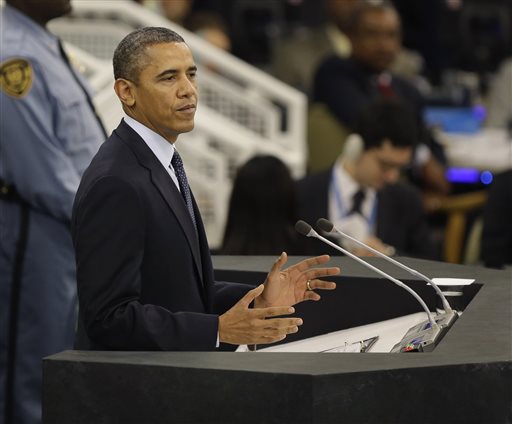Last week, President Barack Obama assured the United Nations General Assembly that Iran did not actually seek nuclear weapons. However, the basis for Obama’s defense of Iranian intentions is an elaborate hoax.
Obama said that a “fatwa,” or religious ruling, by Ayatollah Ali Khamenei (to whom Obama referred by the official honorific, “Supreme Leader”), banned nuclear weapons and provided a basis for future peace:
We are not seeking regime change, and we respect the right of the Iranian people to access peaceful nuclear energy. Instead, we insist that the Iranian government meet its responsibilities under the Nuclear Non-Proliferation Treaty and UN Security Council resolutions.
Meanwhile, the Supreme Leader has issued a fatwa against the development of nuclear weapons, and President Rouhani has just recently reiterated that the Islamic Republic will never develop a nuclear weapon.
These statements made by our respective governments should offer the basis for a meaningful agreement. We should be able to achieve a resolution that respects the rights of the Iranian people, while giving the world confidence that the Iranian program is peaceful.
However, as the Middle East Media Research Institute (MEMRI) reports, that fatwa “was never issued by Supreme Leader Khamenei and does not exist; neither the Iranian regime nor anybody else can present it.”
Instead, MEMRI notes:
The deception regarding “Khamenei’s fatwa” has been promoted by the Iranian regime and its spokesmen for several years. Each time it was mentioned, the “fatwa” was given a different year of issue – for example, 2005, 2007, or 2012 – but the text of the “fatwa” was never presented.
MEMRI has conducted in-depth research with regard to this “fatwa” and has published reports demonstrating that it is a fiction.
The entire basis for Obama’s adventurous belief in new negotiations with the Iranian regime–and the very legitimacy of that regime, mentioned in the same breath–is, therefore, false. Neither the White House nor the intelligence agencies that presumably provide the president with information have correct information about Iranian intention and the past statements of Iranian leaders–a troubling prospect as new talks begin.
Update: Former Secretary of State Hillary Clinton referred to the alleged fatwa in April 2012, prompting a renewed debate about whether the fatwa actually exists. Some scholars are adamant that it does not; other sources suggest that even an oral fatwa, such as Khamenei’s is thought (by some) to be, remains valid.
The final word, perhaps, belongs to Kenneth Pollack, who discusses the fatwa in his recent book Unthinkable: Iran, the Bomb, and American Strategy. Pollack–who favors diplomacy and containment over military action in Iran–discusses the fatwa debate at length and suggests that “no Westerner has seen it.” He notes that the fatwa has been described by Iranian officials but never actually formally issued, and is often accompanied by other promises (such as adherence to international agreements) later proven false. “Of greater importance,” he notes, “the Iranian government has ignored or reversed other fatwas when reasons of state made them inconvenient.” He adds that the late Ayatollah Khomeini had also issued a fatwa against weapons of mass destruction, including nuclear weapons, on to break them during the Iran-Iraq War (58-59).
Put another way, the evidence on which President Obama is basing his decision to trust the Iranian regime is far weaker than the evidence on which George W. Bush based his decision not to trust Iraq’s Saddam Hussein.

COMMENTS
Please let us know if you're having issues with commenting.